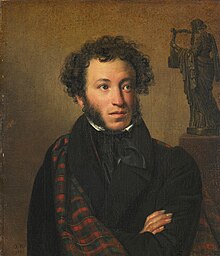The stories of the late Ivan Petrovich Belkin
The stories of the late Ivan Petrovich Belkin ( Russian: Повести покойного Ивана Петровича Белкина , Powesti pokoinowo Iwana Petrovicha Belkina ) is the title of a collection of stories ( 1799–18 ) by the Russian writer Alexander Pushkin (1799–1837). The stories were written in autumn 1830 and were the poet's first complete prose work.
History of origin
In May 1830, Alexander Pushkin got engaged to Natalia Goncharova (1812–1863). On the occasion of the upcoming wedding, his father transferred part of the Boldino estate in the Nizhny Novgorod governorate to him . He went there at the end of August to arrange the division and takeover of the property. His planned return to Moscow was prevented by the cholera outbreak and the resulting quarantine measures. He was forced to stay on Boldino, and this time in rural seclusion became his most creative period. In just under three months from his arrival on August 22nd, July / September 3, 1830 greg. until his departure at the end of November he wrote The Stories of the late Ivan Petrovich Belkin , the dramatic scenes The Stingy Knight , Mozart and Salieri , The Feast during the Plague and The Stone Guest (original title Don Juan ). He wrote about thirty poems in different verse and stanza forms and the verse tale Das Häuschen in Kolomna . He began The History of the Village of Gorjuchino and finished the first version of the verse novel Eugene Onegin .
content
- Preface : Pushkin pretends to be only the editor of the stories. The real author, he writes, is the late landowner Ivan Petrovich Belkin, who heard these stories from other people and then recorded them. The preface contains a brief ironic biography of Belkin's life.
- The shot : The duel between two officers is interrupted and a few years later continued in an unusual way.
- The snowstorm : a young girl decides to secretly and against the will of her parents to marry a young lieutenant; the wedding turns into a tragic comedy .
- The coffin carpenter : A drunk coffin carpenter invites the deceased (“those who are dedicated to his work”) to the inauguration of his house; the dead appear to him in a dream.
- The postmaster : The only daughter of a postmaster leaves home with a passing hussar officer and her father is left behind in despair.
- Miss Farmer's wife : The son of a wealthy landowner falls in love with the daughter of a hostile neighbor, who, however, poses as a simple peasant girl.
style
- “[...] there is no unnecessary description and few dialogues. Everything is action. "( Rolf-Dietrich Keil )
- "Pushkin [...] uses his stylistic means pianissimo, so to speak."
- "[...] in any case one has to write stories like this, simply, briefly and clearly." (Pushkin himself about his work)
Trivia
- In 1940 the German feature film Der Postmeister was made with Heinrich George in the title role. However, the plot of the film differs considerably from Pushkin's original.
- Georgi Wassiljewitsch Swiridow composed the orchestral work Der Schneesturm. Musical illustrations based on the novella by Pushkin (1975).
- Fräulein Bäuerin served Leo Stein as the literary model for the libretto for the operetta Poland Blood by Oskar Nedbal .
literature
- Alexander S. Pushkin: Stories . 8th edition. Deutscher Taschenbuchverlag, Munich 1991, ISBN 3-423-02009-1 .
Individual evidence
- ^ Rolf-Dietrich Keil: Alexander Puschkin. A poet's life . 2001, p. 311 .
- ↑ Pushkin received rule over 200 souls (serfs) in the village of Kistenjowka.
- ↑ Note. A year later, in autumn 1831, the final version was created after some changes.
- ^ Rolf-Dietrich Keil: Alexander Puschkin. A poet's life . 2001, p. 329 .
- ↑ in: Alexander S. Pushkin: Stories . 1991, p. 450 .
- ^ Rolf-Dietrich Keil: Alexander Puschkin. A poet's life . 2001, p. 330 .
